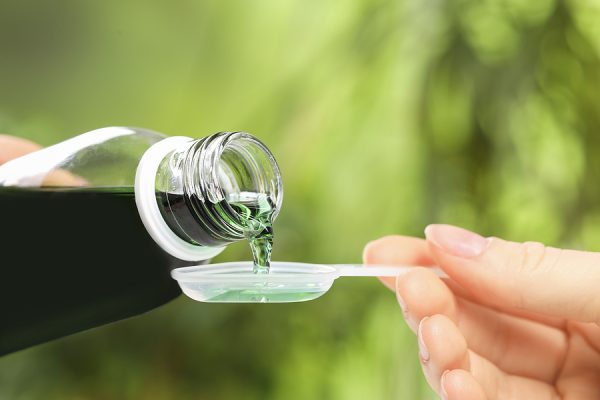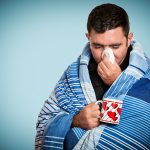If you catch a cold this winter, you’ll probably find yourself standing in the cold-and-flu aisle at your local drugstore trying to figure out what to take. Do you need a decongestant, antihistamine, cough suppressant, or something else?
The thing is, nothing you take will actually cure a cold or shorten its duration. And, according to an expert panel at the journal Chest, none of those meds will make a cold-related cough less severe or make it go away faster, either.
So whether you take cough and cold medicines or not, a cold will generally run its course in seven to 10 days, and a typical cold-related cough can last three weeks or more.
Still, 70% of people here in the U.S. take an over-the-counter cold or cough medicine. And they often underestimate the side effects that come with them. After all, they’re not prescription, right? So how harmful could they be?
Well, some of the ingredients are pretty bad for you.
Decongestants, Antihistamines and Acetaminophen
While the decongestant pseudoephedrine (Sudafed) can help clear up the sinuses, it also raises blood pressure. Other side effects include agitation, insomnia, drowsiness, jitters and headaches.
And pseudoephedrine shouldn’t be used by people with cardiovascular disease, hyperthyroidism, enlarged prostate, glaucoma, diabetes, or impaired liver or kidney function. It can aggravate all of these conditions.
So it’s probably not a good idea for older individuals, especially those with multiple health concerns, to take pseudoephedrine.
Another decongestant, phenylephrine (Sudafed PE, Neo-Synephrine), carries the same warnings as pseudoephedrine. And the sad thing about this drug is that it doesn’t even work to relieve congestion.
Then there are the antihistamines. They can cause fatigue, dizziness and confusion; all of which increase the risk of falls and injuries.
Even worse, antihistamines with diphenhydramine (Benadryl, Unisom Sleep Gels), chlorpheniramine (Advil Allergy & Congestion Relieve, Chlor-Trimeton), and doxylamine (Unisom) contain anticholinergic compounds that are associated with dementia and a loss of mental faculties.
And what about acetaminophen? It’s an ingredient found in the large majority of cold meds. In fact, acetaminophen is in over 600 OTC and prescription meds.
Sadly, acetaminophen is the most common cause of acute liver failure here in the U.S. And about 50% of hospitalizations from acetaminophen are because of unintentional overdoses.
That’s a big problem, because it can be really easy to mix and match two or three different acetaminophen-containing cold meds without realizing it.
For example, let’s say you’re taking regular doses of acetaminophen-containing Nyquil or Theraflu Cold & Cough throughout the day, along with a couple of Tylenol capsules every few hours.
This would mean you’re getting 1,000 or more milligrams of acetaminophen several times a day! The maximum recommendation is to get no more 3,000 milligrams daily, and even that is likely too much for older adults. And never ever around alcohol!!
So please! Read your labels and never take more than one acetaminophen-containing medication at a time.
And by the way, if you choose a multiple symptom medication with the idea that “more is better,” think again. They can contain two, three or four different medications in a single dose, which increases your chance of side effects.
Natural Relief for Cold and Cough Symptoms
Cold symptoms are triggered by your body’s own immune response. They are your body’s way of fighting off the virus and getting all of that germy mucus out of your body.
So instead of taking a cold or cough medication that does nothing to speed recovery or tame your cough, why not relieve your symptoms naturally?
The idea is to thin down all of that phlegm and mucus to make you feel more comfortable.
One of the best ways to loosen mucus is to keep your mucus membranes moist by drinking plenty of liquids.
A tall glass of water several times a day will do you a world of good. Hot tea or warm water with a little ginger, honey and lemon are even better. The steam from these heated beverages helps break down mucus even further. At the same time, they contain multiple anti-inflammatory compounds that may help control coughing.
You can also break up mucus and reduce coughing by taking steamy, 15-minute showers.
One of the tricks I learned a long time ago is to place a few drops of eucalyptus or menthol oil in a small container and take it into the shower with you. Place it in an area where the shower spray won’t wash it away. As the steam from the hot water releases the vapors, it will help clear out your throat and sinuses.
Another great way to clear up your sinuses is by flushing your nasal passages with a probiotic sinus rinse or even normal saline or boiled cooled down water. This will infuse your nostrils with healthy bacteria and help displace those that aren’t so healthy and in the case of saline or water flushes, help reduce the level of viruses causing your misery
For the probiotic flush just mix a regular probiotic capsule with 8 ounces of saline solution. Then, use a neti pot or rubber ear bulb to gently flush each nostril with the formula before bedtime each night.
And don’t forget good, old-fashioned chicken soup. It really works to break down mucus and eliminate it faster. That’s because the ingredients help reduce the inflammatory response that triggers the release of mucus.
SOURCES:
Malesker MA, Callahan-Lyon P, Ireland B, Irwin RS; CHEST Expert Cough Panel. Pharmacologic and Nonpharmacologic Treatment for Acute Cough Associated With the Common Cold: CHEST Expert Panel Report. Chest. 2017 Nov;152(5):1021-1037.
Głowacka K, Wiela-Hojeńska A. Pseudoephedrine-Benefits and Risks. Int J Mol Sci. 2021 May 13;22(10):5146.
Hatton RC, Hendeles L. Over-the-Counter Oral Phenylephrine: A Placebo for Nasal Congestion. J Allergy Clin Immunol Pract. 2015 Sep-Oct;3(5):709-10.
Horak F, Zieglmayer P, Zieglmayer R, Lemell P, Yao R, Staudinger H, Danzig M. A placebo-controlled study of the nasal decongestant effect of phenylephrine and pseudoephedrine in the Vienna Challenge Chamber. Ann Allergy Asthma Immunol. 2009 Feb;102(2):116-20.
Farzam K, Sabir S, O’Rourke MC. Antihistamines. In: StatPearls [Internet]. Treasure Island (FL): StatPearls Publishing. [Updated 2022 Jul 15]
Gray SL, Anderson ML, Dublin S, Hanlon JT, Hubbard R, Walker R, Yu O, Crane PK, Larson EB. Cumulative use of strong anticholinergics and incident dementia: a prospective cohort study. JAMA Intern Med. 2015 Mar;175(3):401-7.
Agrawal S, Khazaeni B. Acetaminophen Toxicity. In: StatPearls [Internet]. Treasure Island (FL): StatPearls Publishing. [Updated 2022 Aug 1]
Don’t Double Up on Acetaminophen. Consumer Update. Food and Drug Administration.
Sanu A, Eccles R. The effects of a hot drink on nasal airflow and symptoms of common cold and flu. Rhinology. 2008 Dec;46(4):271-5.
Saketkhoo K, Januszkiewicz A, Sackner MA. Effects of drinking hot water, cold water, and chicken soup on nasal mucus velocity and nasal airflow resistance. Chest. 1978 Oct;74(4):408-10. Rennard BO, Ertl RF, Gossman GL, Robbins RA, Rennard SI. Chicken soup inhibits neutrophil chemotaxis in vitro. Chest. 2000 Oct;118(4):1150-7.




